The Cycle of Abuse — Feminism and Trauma in LISA: The Painful, Part 3
Part 3 examines the consequences of Brad's actions on his relationship with Buddy
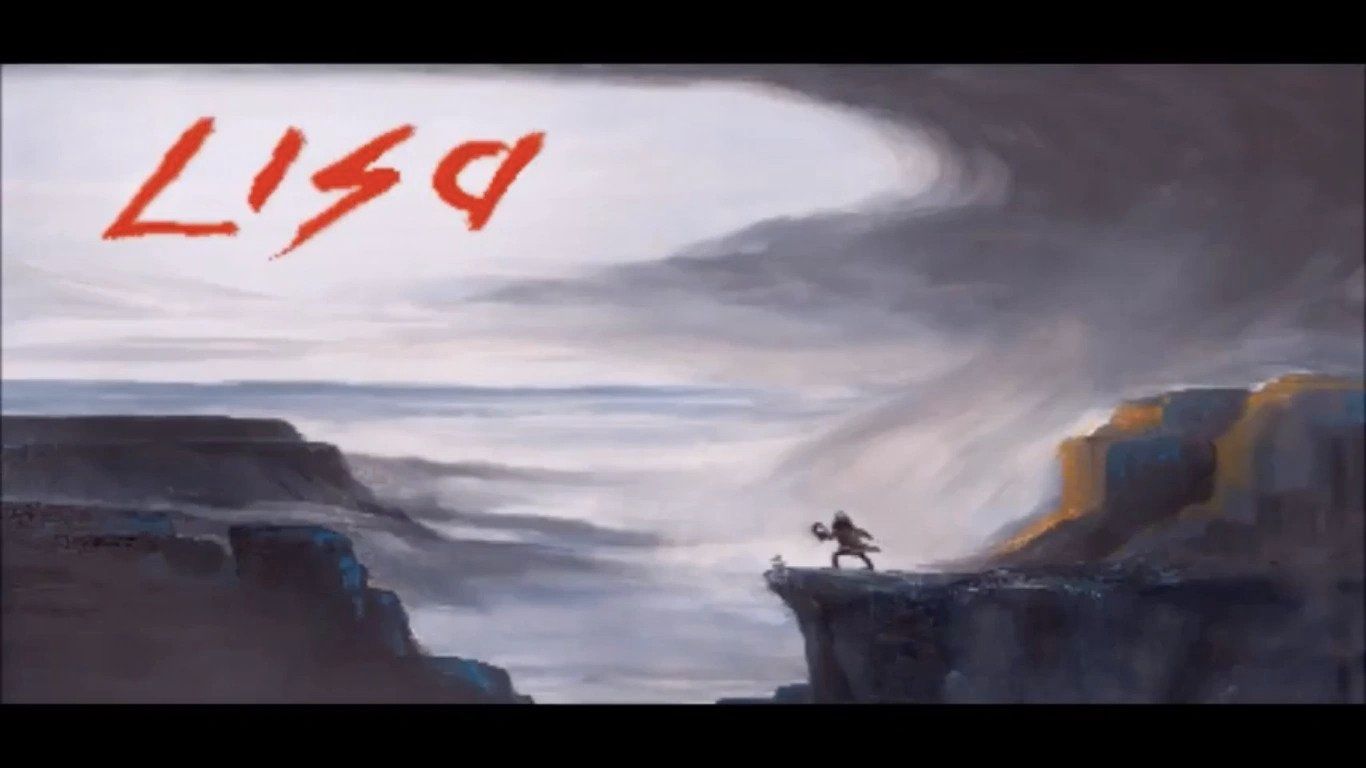

If you're at all like me, you spent the first half of LISA rooting for its tragic protagonist, Brad Armstrong. In part 1 of my series, we discovered that Brad's harsh exterior comes from a lifetime of abuse and trauma at the hands of other men. And unlike those other men, now all chasing after Brad's adoptive daughter Buddy, seemingly the last girl alive, Brad makes his search across Olathe's rugged deserts to make sure Buddy can live a normal life. Surely, he isn't like the other men of Olathe, is he? In part 2, we met Buddy's ragtag band of allies, who showed us another side of Brad, a man who could be giving, compassionate, and supportive. There's a chance for him, isn't there?
If you thought this was the kind of story where a man learns from his mistakes, fights the patriarchal world around him, and wins, becoming a better person along the way, I'm sorry to disappoint you. The cycle of abuse, as the game reveals by its third act, is too powerful for Brad to withstand, and the pull of toxic masculinity leads to some of the most disturbing acts I've ever seen in gaming. Things start to get much worse from here.
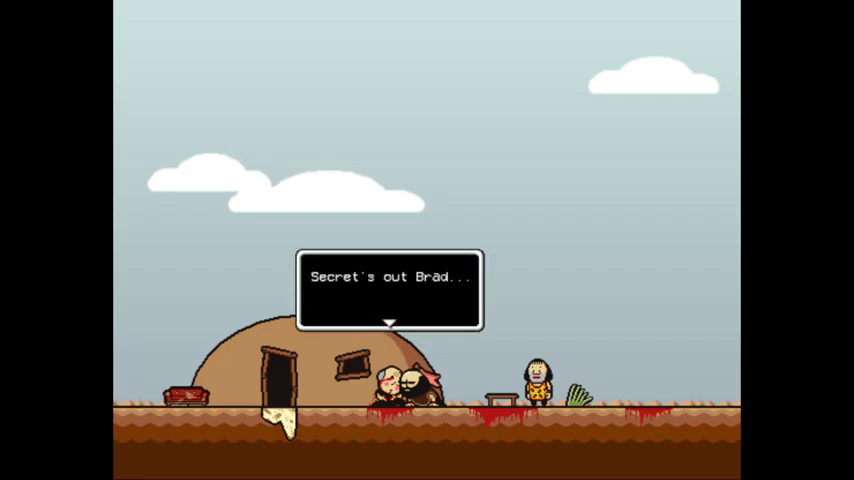
To understand Brad’s narrative role as Olathe’s tragic hero with a heart of both gold and blood diamonds, we need to look at the world that created men like him, and Buddy’s role in all of it as the world’s last woman. A word of warning that this article will approach distressing topics including misogyny, violence, rape culture, and parental abuse. Just about every man in the world is out to get this poor girl and they have, for whatever it’s worth, less pure motives than Brad, who just wants Buddy to have a normal life.
The first real gameplay encounter of Brad’s journey is against Walter Stingray, a muscular shirtless man in bloodshot sunglasses. He stands off against Brad as he approaches, bloody spear in hand and dead body next to him, exclaims, “I want that little bitch all to myself,” and charges. Brad kills him in self-defense, goes into a cave, and finds another man at the brink of death (presumably by Walter’s hands), and the only thing this dying man can think to say is “I can’t believe it… Such an ugly girl.”
A little farther in, Brad overhears a tough-looking gang, the Sugar Boy Drifters, stating their plans to abduct and take advantage of Buddy. On the way out, Brad gets in another fight with the Sugar Boy Drifters leader, whose dying words are “Hopefully she’s already dead so I can see her in Hell...” If he can’t personally be the alpha male who gets laid when no one else could, he would rather see her dead along with the extinction of humanity.
Even before everyone found out about the last girl on earth, Olathe’s society was built on, at best, the memory of women, and at worst, rape culture. The new post-apocalypse currency is printed pornography, which is exchanged for food, drinks, and weapons. Erotic cuneiform lines cave walls.
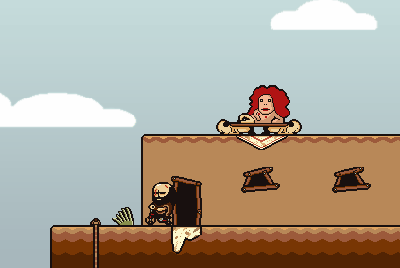
For recreation, the bros go to Muscle Cave to lift shirtless in front of each other. (A totally heterosexual thing to do.) Sometimes they’ll bench-press weights, shouting the mantra “Eat! Sleep! Murder! Repeat!” but other times they’ll bench weaker men sprawled on bookshelves. In another scene, a man tells Brad he works out so “people will love me one day.” In a mini-game, Brad gets asked to deadlift a refrigerator, a dresser, three oil drums, and a car. If Brad refuses the challenge, saying “I’m okay with myself,” he gets laughed at and fat-shamed. If he accepts, he more than likely gets told he’s not trying hard enough after lifting everything at the same time.
Men don’t really care about each other in this world. In one macabre scene, Brad walks in on a man emotionlessly watching his brother bleed to death on top of a semi-truck, finally saying “Uh… Bye.” Then without missing a beat he immediately starts talking to Brad about the girl. The search for Buddy only amplified the constant warfare happening between gangs. Land and social clout are divided up based on who’s strongest, with the Rando Army on top.
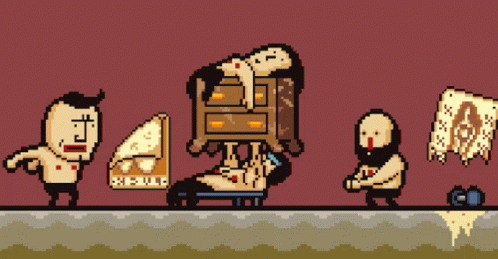
This is not a functioning society in any sense of the word. While its depiction of masculinity is no doubt exaggerated compared to the real world – how else would people act if they know it’s humanity’s final generation before extinction? – there are shades of this in our society: competition, objectifying women, a population starved of positive friendships, arbitrary feats of strength that judge your worth as a human being. It’s a dark reminder of what hyper-masculine society at its worst might be like, perhaps one too far gone. One can imagine what the generation of men and women after Buddy would be like, organized as it is.
Brad is a bit different than the others but in other ways he is the same. The core gameplay loop is built on this irony of protectiveness built on the foundation of violence. Brad travels the deserts and mountains of Olathe, recruits allies, and – in what he sees as “protection” – slaughters hundreds of men also on the hunt for Buddy, all with that now-dead flower from the start of the game in hand (it adds 10 points to your “luck” stat).
Brad’s worst traits are brought to the surface when he finally encounters Buddy after half the game searching. She’s in the care of a much older, more decrepit Marty — Brad’s abusive dad — who claims he’s changed (and yet he’s surrounded by empty beer bottles.) He does tell Buddy “Sweetheart, I don’t think you should take [Joy],” so that’s something? Anyway, Brad completely loses it and tries to kill his father on sight, even as Buddy protests, putting herself between Brad and Marty. This takes place during a scripted boss battle, so the player has to execute attack commands against Marty and Buddy, and can’t escape.

To me, this was the most horrific thing I’ve ever seen in a video game. Brad is depicted as both the victim and perpetrator of patriarchal violence, having internalized all of Marty’s toxic behavior to physically abuse a girl who did the exact same thing Marty abused Brad for as a child: protecting those who can’t protect themselves. Thanks to constant lifelong influences from Brad’s world, he perpetuates a cycle of glorifying strength, emotional repression leading to drug abuse, objectifying women, and, now, domestic violence.
And, after everything that happens, Brad is shocked to learn Buddy never wanted anything to do with him in the first place and, in fact, she’d rather turn herself in to the Rando Army and help repopulate the planet. “I know what’s going on,” she says. “I know how important I am to this world now. People actually need me Brad.”
Buddy: I don’t want your help. Why can’t you leave me alone?
Brad: But…
Buddy: What do you want from me? You’ve done nothing but hurt me.
Brad: No, I want to help you.
Buddy: Rick, Sticky… That’s not what they say.
Brad: They don’t know me Buddy. Nobody does…
Buddy: I do Brad. I know what you really are. You’re a monster. You’ve taken everything away from me.
In addition to how messed up this scene is from the words of a teenage girl, it reinforces the role of toxic masculinity, Brad’s and the rest of the world’s, in inhibiting women's bodily autonomy. In this case, Buddy’s role as the last woman alive makes any decision she makes complicated and absolutely coercive. The options are bleak for someone like Buddy. She can join the Rando Army to essentially become livestock, even if it would ultimately benefit the world. She can leave with her overprotective, abusive father and risk the potential extinction of humanity. Or she can flee on her own and risk far worse outcomes, death or otherwise. Buddy’s ultimate preference is to join the Rando Army. That she’d roll the dice on Olathe’s most feared gang speaks volumes to how dangerous Brad himself has become to Buddy.
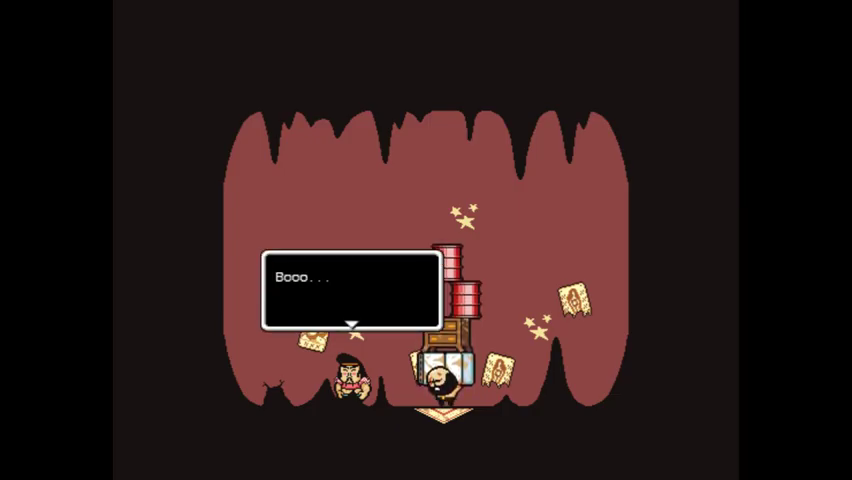
There’s a virtuous foundation to Brad. He's had a hard life, he has a protective side and wants to help others, but he's so trapped in a cycle of trauma that he cannot help himself, much less another person. And so we begin to see that Brad’s suspect goal of raising Buddy as a “second chance” is immediately noble, but ultimately destructive and as he further and further objectifies his daughter into a self-help project to make up for his own self-loathing because he could not save his sister from parental abuse. Brad is not the only person who can save Buddy, and he’s not the best person for the job. But in a world like Olathe’s, one that favors strength, isolation, and power, no man is. And this, I think, exposes the greatest tragedy of all: As men sort out their existential crises, even the ones most victimized by other men, women like Buddy are consistently caught in the crossfire.
Our final part will be a bit less depressing, I promise! (But this is LISA we're talking about, so just a bit less.) Part 4 psychoanalyzes Brad's penchant for cross-dressing, the men who love him, and what this reveals about the game's tragic ending.
